Trust creates gold
Behind every masterpiece — comedic, artistic, or otherwise — is a deep well of trust. Case in point: the legendary sitcom, Arrested Development. As Comedian David Cross shares the story of bringing to life the brilliantly absurd character Tobias Fünke, you’ll hear how every moment of comedic gold on the show was made possible by trust — trusting his collaborators, trusting the writing, and trusting his instincts (“Send the stunt double home. I can do that my own…”).

Transcript
Table of Contents:
- Chapter 1: From the Desk of David Cross
- Chapter 2: I immediately knew Tobias.
- Chapter 3: Shooting the pilot episode.
- Chapter 4: 100% trust.
- Chapter 5: That’s not how people talk.
- Chapter 6: How do I make this funnier?
- Chapter 7: I wouldn’t back down.
- Chapter 8: They didn’t get it.
- Chapter 9: The writing on the wall.
- Chapter 10: It’s hard to say goodbye
- Chapter 11: One of the best days of my life.
- Chapter 12: What Arrested Development means to me now.
Transcript:
Trust creates gold
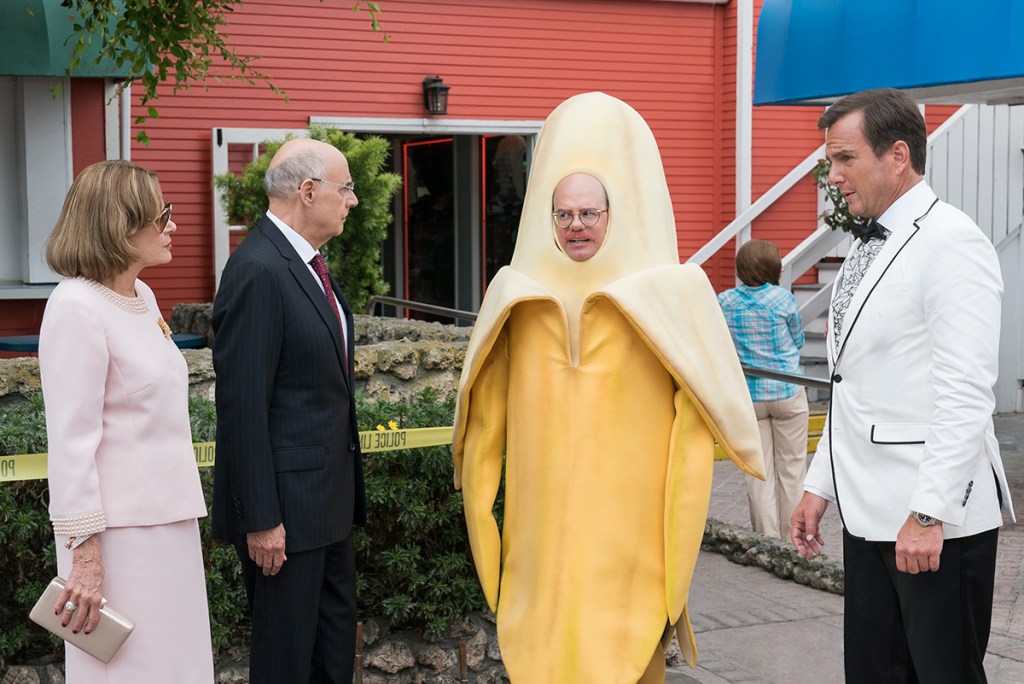
Tobias Fünke was originally meant to have a short character arc. But David Cross realized there was much more to the character. From left, Jessica Walter, Jeffrey Tambor, David Cross, and Will Arnett on the set of Arrested Development. Image courtesy Netflix.
Chapter 1: From the Desk of David Cross
DAVID CROSS: I’ve got a fairly large desk. It was custom-built into the wall here. And this sounds like a sign you’d get in a touristy store, but it’s organized chaos. That just seems like some dumb thing that somebody would have: “This is organized chaos!” and here I have it in needlepoint. I’ve got stacks of notebooks. I have a ton of flash drives from stand-up sets. I got pens. What is this? Oh, I have to get an MRI on my elbow, so here’s that here. And then little things. Like here’s a bookmark that lost its home. And this is a $59.92 reward certificate from Costco because I shop at Costco, which I love. Love Costco. Hate going there, hate it. Have a love-hate relationship with it. I love that I can buy in bulk and I go maybe three times a year. My in-laws stay here quite a bit. It’s always like three weeks and then ends up being five. Lovely people. They use a lot of maple syrup, lots, like more maple syrup than I would use in probably five years, they’ll use in one visit. Maple syrup is expensive. Luckily, Costco, you can get it in a jug, so instead of spending $140 on fucking maple syrup, I’ll just go get the jug of maple syrup for $18, which I do. So there’s my reward from Costco.
JUNE COHEN: That’s comedian David Cross. And he’s about to tell us the story of creating the character Tobias Fünke in the TV show Arrested Development.
This is David’s personal story about developing a totally unique character, on a sitcom that was ahead of its time. But the takeaway applies to anyone in any field: Every great creative work relies on trust.
As David takes us through the journey of creating the unforgettable character Tobias Fünke, you’ll hear how he implicitly trusts the show’s creator Mitchell Hurwitz to create comedic magic — and to fix anything that wasn’t working. You’ll also hear how David trusts himself — when he knows with certainty that his instincts are right — even when that means rejecting the use of a stunt man and jumping off a second floor landing himself — in a ridiculous and brilliant performance that only David could have delivered.
And here’s what you need to know about David Cross and Arrested Development. The show was created by visionary television director and showrunner Mitchell Hurwitz. When it premiered in 2003, it was groundbreaking for its particular documentary style — paving the way for many comedies to come. The series centers on the dysfunctional Bluth family — played by a legendary ensemble cast, which included Jason Bateman, Will Arnett, Tony Hale — and Ron Howard as the narrator. The show received 25 Emmy nominations — and won six, including Outstanding Comedy Series.
David Cross started his career writing on The Ben Stiller Show, and made a name for himself in the New York alt-comedy scene. You may recognize David from his long career in standup or movies like Waiting for Guffman and Eternal Sunshine of the Spotless Mind. With Bob Odenkirk, he created the beloved sketch series Mr. Show with Bob and David. He also created and starred in the series The Increasingly Poor Decisions of Todd Margaret.
I’m your host June Cohen, and on this episode, you’ll hear original music composed for prepared piano. For visuals while you’re listening, go to sparkandfire.com.
[THEME MUSIC]
Chapter 2: I immediately knew Tobias
What do you do when the right project comes at the wrong time? Know whose opinion to trust.
DAVID CROSS: I got a U-Haul, put whatever I could put into it, and I gave everything else away. I was like: This is it. I’m getting out of here. After having been in L.A. for 9.5 years, it was the first time that I wasn’t working and I had no work set up. New York was a much different place and it was really creative. The comedy and music scene was really thriving, and it was just a great place to be and I wanted more of that.Bought my first-ever apartment. Had a girlfriend that I was way into. I had been in New York for eight months maybe, and I got a call about this script, a sitcom that was going to shoot in L.A. I said, “No thank you.” Bob Odenkirk’s wife, Naomi, who has a really sharp eye for comedy, reached out and said, “This guy, Mitch Hurwitz, who wrote it, is really funny, really great. Please consider it.” “Okay, sure, send it along.” I read it and the script is really funny. I mean, that’s rare, too, when it reads really funny. I eventually said, “Yes, I’ll talk with Mitch.”They were really looking to cast the character Gob. I told them I had no handle on Gob, but I immediately knew Tobias. East Coast, intellectual, Upper West Side, Cambridge, turtleneck sweater-wearing, pseudo-intellectual who’s very dry, thinks he’s funny and droll and really isn’t, mixed with a touchy-feely, new agey, hippy-ish, self-help kind of guy. He wasn’t intended to be a regular. He was just supposed to come in every once in a while. So I said, “This is how I’d like to play him. And to be completely honest, I don’t want to move to L.A. and I would just… I’d be really happy with six episodes. That will be fine by me. I’ll come in and out. You guys put me up at a nice hotel, be there for a week, fly home for a month.”
JUNE COHEN: Did you notice how David initially rejected the series outright — “No thank you”? It was only when he heard from Naomi, who he knew had a sharp eye for comedy, that he agreed to even read the script. David knew to trust Naomi’s opinion — at least long enough to form his own.
Chapter 3: Shooting the pilot episode
DAVID CROSS: We were all just getting to know each other and getting comfortable with each other, which takes a little while. And well into halfway through shooting, we shot the scene when my character, I thought it was a pirate and it was gay guys. We’re all in the jail, prison, I want to say, it was there. I haven’t seen it in, for decades — or quite a while. I shouldn’t pluralize decade. Anyway, it was a scene where the whole cast was together. People were kind of riffing off each other and having fun coming up with all this stuff, looking around, seeing this talented group. And… oh my God, this is the most brilliant, perfect casting of a comedy show. Everybody’s perfect. We’re all on the same page and we’re hitting the same tone. It was just very special, and I had this sinking feeling. I was tamping down that thought. It was deep down at first, and then it was obvious. That became something I was going to have to deal with.I had eaten at the Souplantation, where you can get all-you-can-eat soup and salad for like 12, 13 bucks. Delicious, farm-fresh. I don’t know about that. And picked up my phone, called my then-girlfriend, and said, “This is a really special project. I can tell it’s going to be great and funny, and I need to do this full time and move back to L.A.”
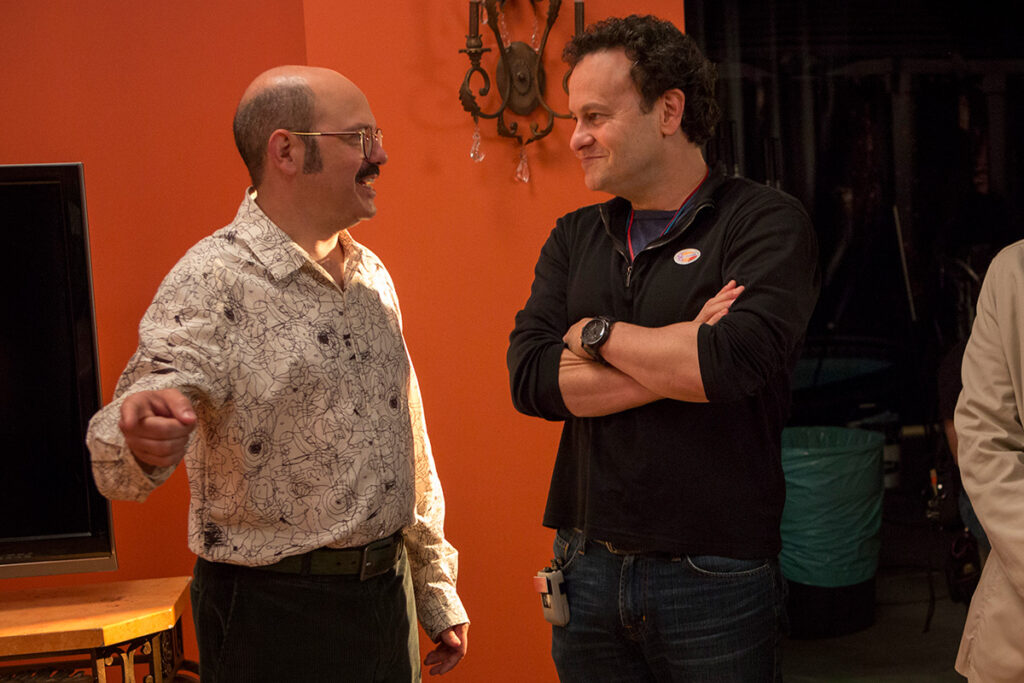
“This guy, Mitch Hurwitz, who wrote it, is really funny, really great.” David Cross and Mitchell Hurwitz on the set of Arrested Development.
Chapter 4: 100% trust
How do you leave your creative mark on a project? Know when there’s nothing to improve on.
DAVID CROSS: It wasn’t like I sat down with Mitch and we said, “Okay, how would Tobias approach this?” I mean, there was none of that. It wasn’t like a theatrical director trying to lead you to find the — what’s the inner turmoil that’s not being shown? It’s none of that. They just put it in our hands and we all worked on it in that collaborative way.Arrested Development was Mitch Hurwitz’s baby. Mitch had ideas for episode 48 that would be in play in episode 4. He had the long game in mind. The documentaries that were on at the time, there’s Cops and I don’t know outside of Cops what other docs there were, but now you see it everywhere. Joe and Anthony Russo — the Russo brothers, as they’re known — were the directors brought on, who really created that docu style of directing and shooting. The camera finding the person or the scene, push in, the camera catching up to somebody. We used to get questions when we’d do panels all the time that there was a lot of improvisation. Sometimes you find something, and that still happened occasionally, but the writing didn’t need it. There’s nothing to improve on.That’s a very rare privileged thing when you can work on a show and the writing is that good. There was 100% trust that everybody had in everybody else. And really there was an understood, unspoken kind of: Mitch knows what he’s doing. Mitch will figure it out. Mitch is on it.
Chapter 5: That’s not how people talk
DAVID CROSS: Literally last night I was in between watching two baseball games flipping around or whatever, and then NCIS or Law & Order, one of those kind of shows, and the acting was terrible, but it was also, like, you could tell it’s probably not the actor’s fault. The dialogue was awful. The direction that the actors got, I’m sure, was to do it this way, and everything about it was like: Nobody would say that in this situation. That’s not how people talk. And that’s not how people would talk if they had one minute to defuse a situation that could get them killed. You don’t talk that way. Nobody says, “Good God, man, snap out of it,” like, nobody would, ever. That was probably said in earnest in 1928. But also, nobody gives a shit. I’m one of the only people who… it’s nails on a chalkboard.Most people hire me with the expectation that part of what I do is to make the characters talk like people talk. Making dialogue sound true. I’ll just go in with some suggestions. It’s just like, Y’know, I don’t know if he would say this. People don’t really talk that way. One exception is Tobias Fünke. He’s not supposed to talk like people normally talk. Of course, whatever crazy nonsense they came up with. It’s not like these are real characters in a real world. It was absurd. Suggestions would be to heighten the absurdity.
Chapter 6: How do I make this funnier?
DAVID CROSS: I come downstairs and I slip and fall, but my right leg stays up in the air. So I’m completely out of frame except my leg is up. Initially it’s not really scripted like, “Tobias falls.” Those were improvised. I love physical comedy, and the physicality stuff is something that I would bring to it. You’re thinking, “How do I make this funny?” I know it’s a plot point, but maybe there’s a way to make this funnier. So sometimes it’s about that. There’s a thing where Tobias is naked. I just have a little piece of pantyhose just to cover my [bleep]. That’s it. So you can still see bush or whatever, but just the minimal amount of what you could cover. It really, really hurts to take that tape off. But it helps to keep a nice, clean, tidy undercarriage.But! So I come down the stairs. Everyone is eating breakfast in the kitchen area. What I improvised at the end, which I really did, was I went, “Oh, a quarter,” and I bent over, which shows a great butthole shot. So they have that, seared into their memories, and that was not scripted.
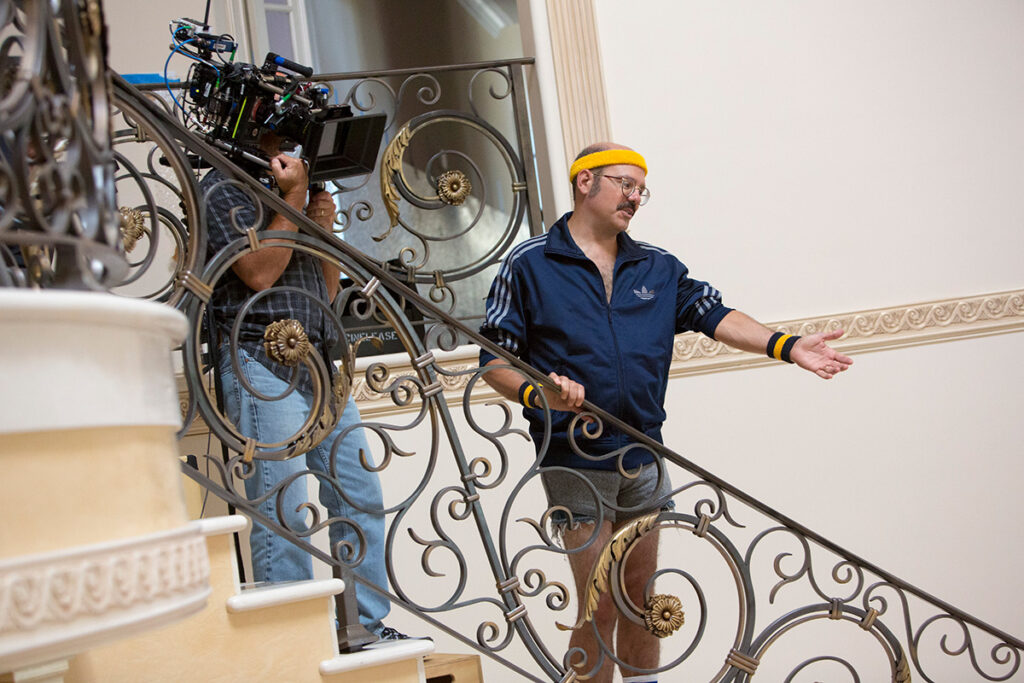
David Cross descending a staircase. Image courtesy Netflix
Chapter 7: I wouldn’t back down
DAVID CROSS: Not Mary — what’s the character’s name? The fucking — Miss Doubtfire or… Featherbottom! Mrs. Featherbottom. Right. In the Mrs. Featherbottom run, I’m trying to impress Maeby, who’s reading. And I have the thing like Mary Poppins, the umbrella, the parasol, and I’m going to float down and land on my ass. I never got shot out of a cannonball or had to dangle out of a helicopter or anything like that. But I love doing my own stunts. So they literally flew a fuckin’ guy from Seattle, I believe, or Portland to do this stunt. And I was — that’s about as frustrated and angry as I’ve been on any production. “Guys, listen, this makes no sense. You’re going to take an hour to get him dressed up and you’re going to have to cut. This is not going to look good. And you know it. Everybody here knows it.” Well over an hour of pleading. I just wouldn’t back down: This is insane. I can do this. I’ve done this a million times. Without padding, I have jumped from higher places. I’ve been fine. Put the pads below camera, it’s fine. And eventually I got my way. It took way too long for them to fucking acquiesce. This guy had flown in and he had even gotten dressed. The guy went somewhere, and we were like, “Let’s do it now.” And there was a safety meeting and all this bullshit. It was ridiculous.And so we shot it, one take. And the thing you see is what I did. I don’t think landing on the table was a part of it. I think it was supposed to be just sort of landing there. And I kind of made it to the coffee table in my jump. And of course, I break it into a million pieces. And of course it didn’t hurt. I got up, it’s fake glass, it’s breakaway furniture, and I fucking dusted myself off, and we kept shooting.
JUNE COHEN: Did you hear the frustration in David’s voice as he remembered how stupid it was to hire a stuntman? He knew with certainty that he could land Tobias’ pratfall in a way the stuntman couldn’t. He had absolute trust in himself. And he was right. He took a flying leap onto that coffee table, and created comedy gold.
Chapter 8: They didn’t get it
DAVID CROSS: Fox, they didn’t really care for the show. An ensemble cast that’s 11 strong with dedicated sets on a studio lot is not a cheap show to make. Our time to present the show on Fox was being cut down. Every year, there was 30 seconds taken out to add more commercials. And the scripts were getting denser and denser and bigger, so you’d have less time to do way more stuff.You’d shoot this thing for half a day. You’d memorize the dialogue. You all had fun, you loved it. But when editing, they didn’t have time for that story. They gotta get rid of it because they had a 40-page script for a 21-minute show. And you’d go to do ADR, additional dialogue recording, to cover an edit. The whole scene’s gone except for a person going, “I’ll get the phone,” where you’ve cut out literally a 4-minute scene. And it was frustrating sometimes, to be honest. It’s like: what’s the point of doing all that work then?
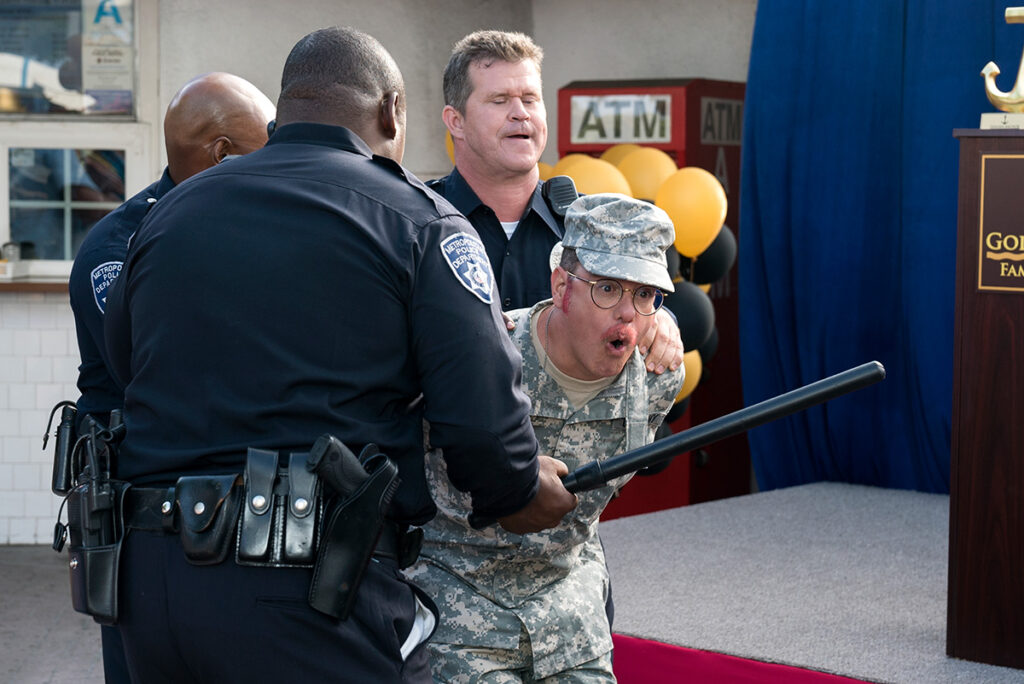
Tobias Fünke (David Cross) is detained. Image courtesy Netflix
Chapter 9: The writing on the wall
DAVID CROSS: We would not have done a third season if we didn’t win an Emmy. That’s a huge deal. To win the Emmy for Best Comedy Series is a big deal. During awards season, at the Fox lot, you drive into the lot and they celebrate their Emmy or Oscar wins or nominations with these massive, beautiful, huge billboards. You go through for, I don’t know, a quarter mile, there’s a security gate, “visitors here,” and you show your ID or whatever, and there was this little thing over the gate. Strung up to some light pole was a vinyl, it was tiny, and it said, “Congratulations, Arrested Development, for your Emmy.” Just this little thing, “Hey, congrats. Good job, guys.” It was a rush job, clearly. Somebody called and went, “Oh, fuck. Now we gotta make one of these things. All right. Jerry, get your guys. Stay in the shop. We need a vinyl thing.” It’s something the art department would make for somebody’s birthday party. Ah, that was great.
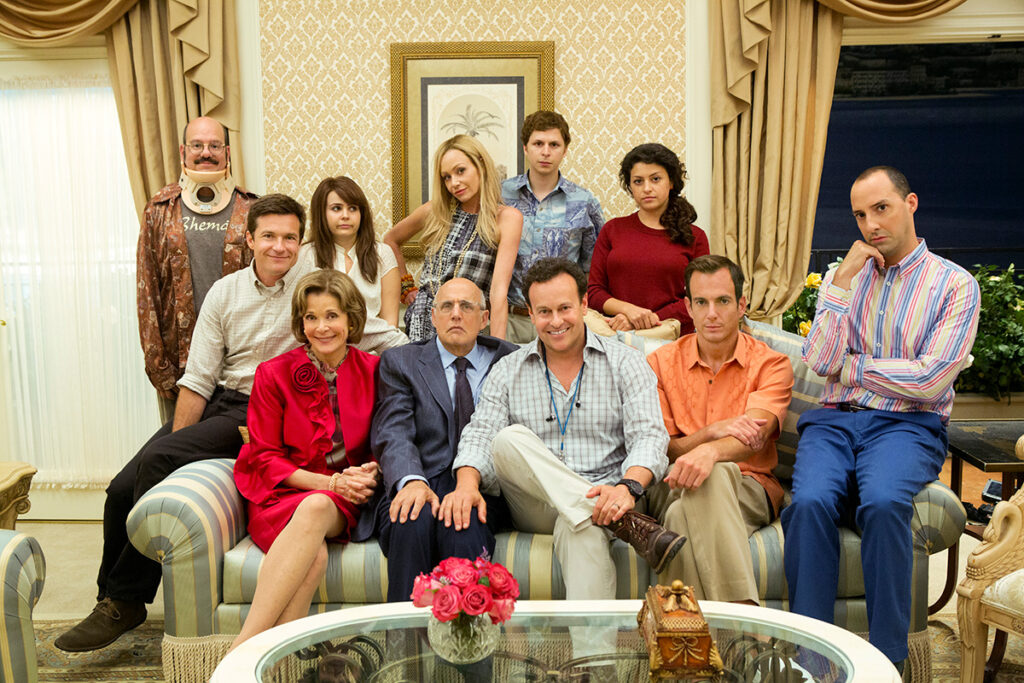
An Arrested Development family portrait. Image courtesy Netflix
Chapter 10: It’s hard to say goodbye
DAVID CROSS: At the end of the day, it just doesn’t matter if you are considered one of the greatest comedies of all time and you’re being awarded and critics love you and you’re on the top 10 list and your actors are getting nominated and/or winning awards. It just doesn’t matter. Their concern is the bottom line. Whenever they aired at Fox on Sunday at 8:30 or whatever the fuck it was, people weren’t watching it. They were still using Nielsen ratings, and that’s not how people watch TV anymore.The whole medium was changing, TiVos and the Hopper and all those things were coming around. DVDs were about to be huge. I think they were one year off. If they had figured it out a year earlier, we’d still be shooting it. When it was canceled, we kind of knew it was coming. So it mitigated the disappointment somewhat because it wasn’t out of the blue. They’re willing to throw an executive under the bus for canceling it and it’s like, “All right, this is going to be on you and we’re doing this, and you go explain it.” And that’s just how it is, unfortunately. It’s a business. It’s a capitalist society and that’s how business works.We’re certainly not the first show that happened to, we won’t be the last. It was hard to say goodbye. I know it’s so trite. It’s been said a million times, but it’s been said a million times for a reason, and that we were like a family. It was tough to go, “Oh, I’m never going to get to play Tobias again. I’m never going to get to dress up in this silly thing that Mitch has thought of and to do this story arc that’s insane. God, I wish there would be some sort of streaming service that would just, like on the net, that would just show flicks or something. I wish somebody would invent something that would start producing its own content that wouldn’t care about ratings. Perhaps then we’ll get to do it again. But I don’t see that ever happening. So, goodbye to you my friends. Let’s stay in touch. And I’ll always have fond memories of it. Wait, what? What do you mean Netflix wants to do it? We all get to… what? This is amazing. And they’re going to pay us a decent wage? What? This is the greatest thing that could ever happen.”
Chapter 11: One of the best days of my life
DAVID CROSS: I will never forget as long as I live, the feeling that we all had the very first scene that we rehearsed, they had re-created, perfectly, Lucille’s penthouse set. I mean perfectly. And we entered in our old wardrobe, there’s Michael’s khakis and blue shirt, there’s Gob’s shiny suit, there’s Tobias’ corduroys and sandal Birkenstocks. Also, we played around almost like little kids. I remember the director having to go, “Okay, guys, enough, enough, we have to shoot. We have to get going.” What an amazing experience that was. And just one of the best days of my life.
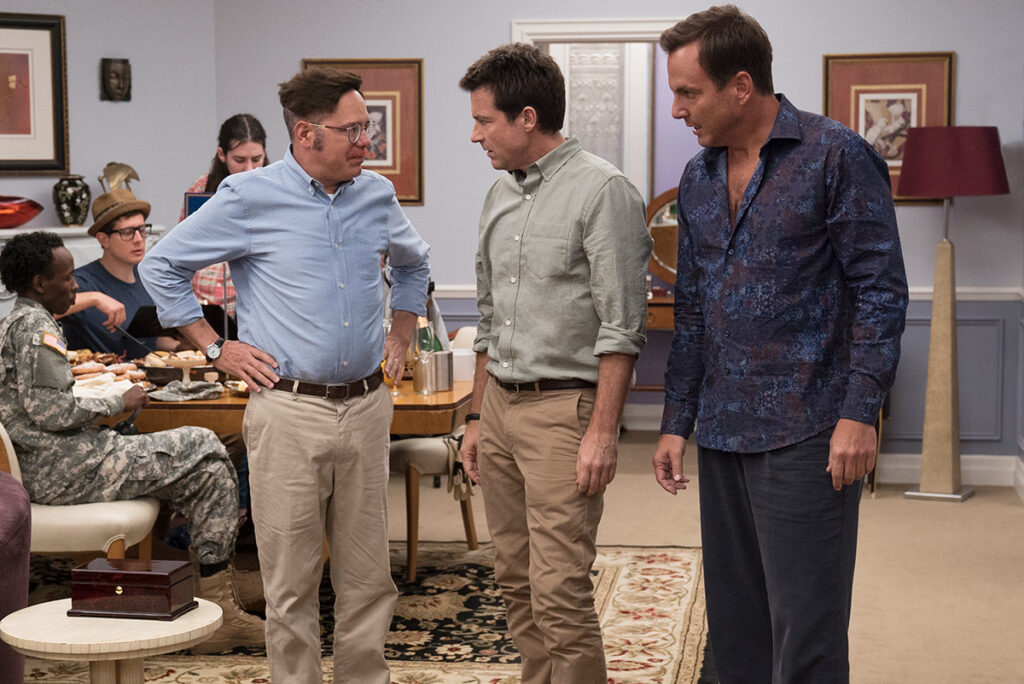
The Arrested Development cast reunited for Seasons 4 and 5. From left, David Cross, Jason Bateman, and Will Arnett. Image courtesy Netflix
Chapter 12: What Arrested Development means to me now
DAVID CROSS: I’ve been very lucky. I haven’t had to work with a lot of assholes. If you’re working on a good project, acting is like a paid vacation. Arrested Development is an extremely fond memory. There are long hours and there are some shitty, extenuating circumstances sometimes. But I realized how lucky I am that I got to be a part of that. And I made lasting friendships. I’ve subsequently worked with so many of the actors and various other projects, and I got to meet a guy like Mitch Hurwitz, who’s just the sweetest, nicest guy you could ask for. I got to be a part of something very, very special. I mean, I’ve never had more fun playing a character. I mean it was just a treat.
JUNE COHEN: I want to thank David for sharing the story with us. And I want to thank you for listening. I hope you heard things in it you can bring into your own work.
It might be how David felt he immediately knew Tobias, and trusted his instinct in taking the part — even though it meant moving back to LA. Or it might be his explanation that — contrary to common assumption — the actors didn’t improvise on the show; they had complete trust in the writing itself. Or maybe it’s the way David insisted on performing the Mrs. Featherbottom stunt — trusting that he could fly off a second floor landing and onto a coffee table, with zero bodily harm.

